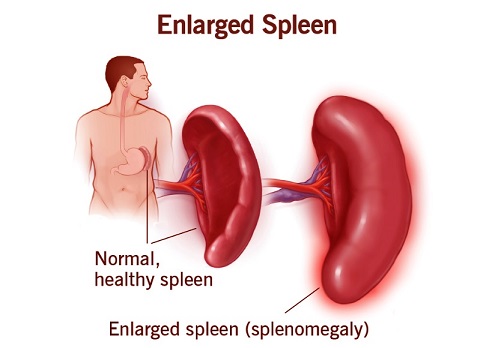Nikhil Prasad Fact checked by:Thailand Medical News Team Feb 21, 2025 1 month, 3 weeks, 8 hours, 3 minutes ago
Medical News: SARS-CoV-2 Induces Significant Morphological Changes in the Human Spleen
The COVID-19 pandemic, caused by the SARS-CoV-2 virus, has primarily been associated with respiratory complications. However, emerging research indicates that the virus also affects various extrapulmonary organs, including the spleen. Understanding the morphological alterations in the spleen due to SARS-CoV-2 infection is crucial for comprehending the full spectrum of COVID-19 pathology. This exlusive
Medical News report is one of the few that covers the effects of COVID-19 on the human spleen and involves a very basic meta study conducted by Thailand
Medical News.
 COVID-19 Alters the Human Spleen and Can Cause Spleen Ruptures!
Morphological Changes Observed in the Spleen
COVID-19 Alters the Human Spleen and Can Cause Spleen Ruptures!
Morphological Changes Observed in the Spleen
A recent study aimed to estimate the incidence of splenic infarction and abscess in COVID-19 patients and to examine the clinical and morphological changes in the infected spleen. The study found that 63.5% of patients had an enlarged spleen, with sizes ranging between 12.1 cm × 5.1 cm and 19.2 cm × 12.2 cm. The incidence of splenic infarction was 36.4%, while splenic infarction complicated by abscess occurred in 18.1% of cases. The size of splenic infarcts varied from 3.1 cm × 1.4 cm to 10.2 cm × 4.3 cm. Additionally, splenic abscesses were present in 72.3% of patients. Of 596 patients with severe COVID-19, 12 had at least one splenic abscess (2.3%): three patients had multiple splenic abscesses, while the rest had a single abscess pocket. Splenic infarction was found in 116 patients (22.5%), including six patients who later developed splenic abscesses.
https://www.ejgm.co.uk/article/clinical-and-morphological-changes-of-the-spleen-in-covid-19-patients-with-and-without-splenectomy-14935
A number of studies have validated that COVID-19 causes the enlargement of the human spleen.
https://www.sciopen.com/article/10.37015/AUDT.2023.230056
https://www.clinicalimaging.org/article/S0899-7071(21)00196-0/fulltext
In some cases, the enlargement of the spleen due to SARS-CoV-2 had also led to dangerous spleen ruptures!
https://www.sciencedirect.com/science/article/pii/S2590170220300297
https://www.degruyter.com/document/doi/10.1515/jom-2021-0291/html
https://bmcpediatr.biomedcentra
l.com/articles/10.1186/s12887-022-03353-8
https://academic.oup.com/jscr/article/2022/4/rjac124/6572666
https://journal.chestnet.org/article/S0012-3692(23)02485-6/fulltext
What is worrisome is that during the initial stages of SARS-CoV-2 affecting the spleen, many are not aware of what is happening to their bodies as there are no symptoms but when things have progressed to a stage where splenic infarctions or ruptures occurs, it can be fatal!
Mechanisms Leading to Splenic Alterations
The spleen plays a pivotal role in the body's immune response, acting as a filter for blood and a site for immune cell proliferation. SARS-CoV-2's impact on the spleen can be attributed to several factors:
-Direct Viral Infection: Studies have demonstrated that SARS-CoV-2 can directly infect the spleen. The virus has been detected in splenic tissues, suggesting that direct viral invasion contributes to tissue damage.
https://www.medrxiv.org/content/10.1101/2020.03.27.20045427v1
-Immune-Mediated Damage: The infection triggers a hyperactive immune response, leading to the release of pro-inflammatory cytokines. This cytokine storm can cause apoptosis of lymphocytes and other immune cells within the spleen, resulting in lymphocyte depletion.
-Coagulopathy: COVID-19 is associated with coagulation abnormalities, increasing the risk of thrombotic events. The formation of microthrombi can lead to splenic infarctions, where blood flow to parts of the spleen is obstructed, causing tissue death.
Clinical Implications of Splenic Changes
The morphological changes in the spleen have several clinical consequences:
-Increased Susceptibility to Infections: Lymphocyte depletion weakens the immune system, making patients more vulnerable to secondary infections.
https://www.liebertpub.com/doi/abs/10.1089/vim.2020.0320?journalCode=vim
-Diagnostic Challenges: Splenic infarctions and abscesses can present with non-specific symptoms, such as abdominal pain and fever, complicating the diagnosis.
-Management Considerations: Recognizing splenic involvement in COVID-19 is essential for comprehensive patient care. It may necessitate specific imaging studies and tailored therapeutic approaches to address complications like abscess formation.
Conclusion
SARS-CoV-2 infection leads to significant morphological alterations in the human spleen, including splenomegaly, infarctions, and abscesses. These changes result from direct viral invasion, immune-mediated damage, and coagulopathy. Awareness of these effects is vital for clinicians to ensure prompt diagnosis and management of splenic complications in COVID-19 patients.
Additional References:
https://www.wjgnet.com/1007-9327/full/v27/i35/5919.htm
https://www.cureus.com/articles/230680-exploring-the-correlation-between-splenomegaly-and-lung-involvement-in-covid-19-a-retrospective-study#!/
https://www.sciencedirect.com/science/article/pii/S0344033821002715
https://ejrnm.springeropen.com/articles/10.1186/s43055-022-00793-1
https://www.omicsonline.org/open-access/covid19-spleen-involvement-or-coincidence-115171.html
https://www.sciencedirect.com/science/article/pii/S2590170220300297
For more about the efefcts of SARS-CoV-2 on the human spleen, keep on logging to Thailand
Medical News.
Read Also:
https://www.thailandmedical.news/news/covid-19-causes-spleen-enlargement
https://www.thailandmedical.news/news/covid-19-news-researchers-warn-that-sars-cov-2-infections-can-lead-to-splenic-infarctions
https://www.thailandmedical.news/news/doctors-warn-that-kissing-disease-can-cause-potentially-fatal-spleen-rupture
https://www.thailandmedical.news/pages/thailand_doctors_listings
